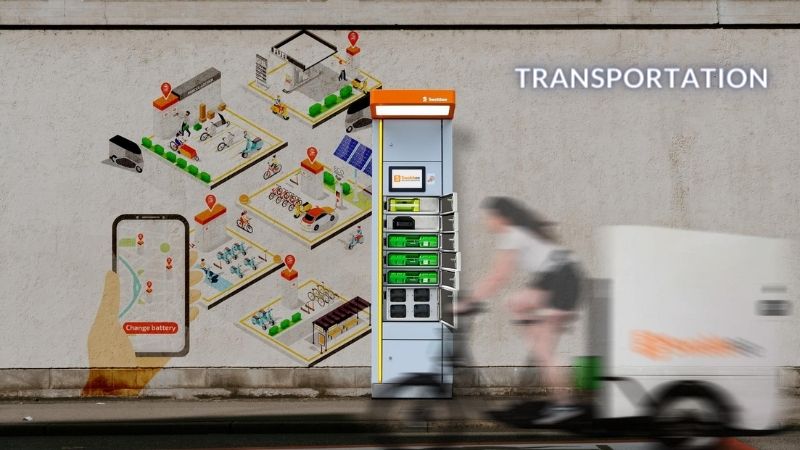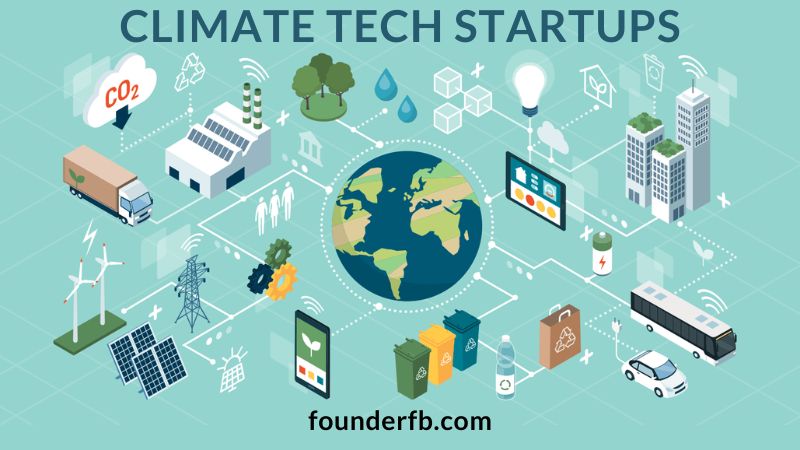In the race against climate change, innovative solutions are emerging from the dynamic world of climate tech startups. These entrepreneurial ventures are at the forefront of developing groundbreaking technologies and sustainable business models to combat the environmental challenges we face. From renewable energy to carbon capture and sustainable agriculture, climate tech startups are revolutionizing industries and paving the way towards a greener future. Lets explore with Founderfb about this latest technologies right now.
Climate Tech Startups
1. Renewable Energy
Renewable energy stands as a cornerstone of the climate tech movement, with startups like Sunrun leading the charge. Sunrun’s mission is to democratize access to solar energy, empowering homeowners to generate clean electricity and reduce their carbon footprint. By offering innovative financing options and cutting-edge solar technology, Sunrun is revolutionizing the way we power our homes.

Similarly, rooftop solar startups are leveraging the untapped potential of urban spaces to harness solar energy. These innovative ventures install solar panels on residential and commercial rooftops, transforming idle rooftops into renewable energy generators. By utilizing otherwise unused space, rooftop solar startups are making significant strides in decentralizing energy production and reducing reliance on fossil fuels.
Limejump is another notable player in the renewable energy sector, focusing on energy trading and optimization. By leveraging advanced analytics and machine learning algorithms, Limejump maximizes the value of renewable energy assets and helps balance supply and demand on the grid. This dynamic approach to energy management is essential for integrating renewable energy sources into the power grid effectively.
2. Energy Efficiency
In the realm of energy efficiency, climate tech startups like Carbon Lighthouse are revolutionizing building operations. Carbon Lighthouse utilizes artificial intelligence to identify and implement energy-saving measures in commercial buildings, reducing carbon emissions and lowering operating costs. Through continuous monitoring and optimization, Carbon Lighthouse is driving significant improvements in energy efficiency across various industries.
Opus 12 is tackling the challenge of carbon emissions by developing technology to convert CO2 into valuable products. By harnessing the power of electrochemistry, Opus 12 can transform carbon dioxide emissions into useful chemicals and fuels, mitigating the environmental impact of industrial processes. This innovative approach holds immense potential for reducing greenhouse gas emissions and advancing the transition to a low-carbon economy.
3. Transportation
Transportation is another critical area where climate tech startups are making a significant impact. Tesla, a pioneer in electric vehicles, has revolutionized the automotive industry with its sleek and sustainable electric cars. By offering high-performance electric vehicles with long-range capabilities, Tesla has accelerated the adoption of electric transportation and reduced reliance on fossil fuels.

Bird, a leading electric scooter rental service, is transforming urban mobility and reducing carbon emissions in cities worldwide. By providing convenient and eco-friendly transportation options, Bird is encouraging commuters to ditch their cars and embrace sustainable alternatives. With its dockless electric scooters and user-friendly mobile app, Bird is revolutionizing the way people navigate urban environments.
ChargePoint is another standout in the transportation sector, focusing on building electric vehicle charging infrastructure. As the demand for electric vehicles continues to rise, ChargePoint is expanding its network of charging stations to support the growing fleet of electric cars. By providing reliable charging solutions, ChargePoint is removing barriers to electric vehicle adoption and accelerating the transition to a zero-emission transportation system.
4. Agriculture and Food
In agriculture and food, climate tech startups are leveraging technology to promote sustainability and resilience. Indigo Agriculture is pioneering the use of microbial products and digital technologies to improve crop yield and soil health. By harnessing the power of beneficial microbes and data-driven insights, Indigo Agriculture is helping farmers increase productivity while reducing the environmental impact of agriculture.
Impossible Foods is disrupting the food industry with its plant-based meat alternatives, offering consumers a sustainable and delicious alternative to traditional meat products. By using innovative ingredients and cutting-edge food science, Impossible Foods has created plant-based burgers and other meat substitutes that look, taste, and cook like meat but with a significantly lower environmental footprint.
Vertical farming startups, such as AeroFarms, Plenty, and Bowery Farming, are revolutionizing agriculture by growing crops indoors using controlled environments and advanced technology. By eliminating the need for arable land and minimizing water usage, vertical farming startups are producing fresh, nutritious produce with minimal environmental impact. These innovative farming methods have the potential to revolutionize food production and address the challenges of feeding a growing global population sustainably.
5. Carbon Capture and Storage
In the realm of carbon capture and storage, climate tech startups like Climeworks and Carbon Engineering are developing innovative solutions to remove CO2 from the atmosphere. Climeworks specializes in direct air capture technology, capturing CO2 from the air and storing it underground or using it for various industrial applications. Carbon Engineering, on the other hand, focuses on capturing CO2 from industrial sources and converting it into synthetic fuels and chemicals, offering a scalable and cost-effective approach to carbon removal.

6. Sustainable Materials and Recycling
Sustainable materials and recycling are also areas of focus for climate tech startups seeking to reduce waste and promote circular economies. Recycling Technologies is developing innovative machines to recycle plastic waste into valuable products, closing the loop on plastic pollution and reducing reliance on virgin materials. Ecovative Design is another standout in the sustainable materials space, producing biodegradable alternatives to plastics and other non-sustainable materials.
7. Climate Analytics and Data
In the realm of climate analytics and data, startups like Climacell and Tomorrow.io are leveraging advanced technology to provide accurate weather predictions and climate risk management solutions. By combining meteorological data with artificial intelligence and machine learning algorithms, these startups are helping businesses and governments better understand and mitigate the impacts of climate change.
8. Water Conservation and Management
Water conservation and management are critical challenges facing our planet, and climate tech startups are stepping up to address them. Xylem is a leader in water technology, providing innovative solutions for efficient water management and conservation. From smart water meters to advanced wastewater treatment systems, Xylem is helping communities around the world safeguard their water resources and adapt to a changing climate.
Desalination startups, such as WaterFX and Desolenator, are developing sustainable technologies to turn seawater into freshwater, addressing water scarcity issues in coastal regions. By harnessing renewable energy sources and innovative desalination techniques, these startups are providing communities with a reliable and sustainable source of freshwater, reducing pressure on dwindling freshwater resources.
Conclusion
In conclusion, climate tech startups are driving innovation and shaping the future of sustainable development. From renewable energy and energy efficiency to transportation and agriculture, these entrepreneurial ventures are harnessing the power of technology to address the urgent challenges of climate change. With their pioneering spirit and commitment to sustainability, climate tech startups are leading the way towards a greener, more resilient future for generations to come.



